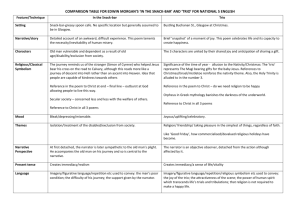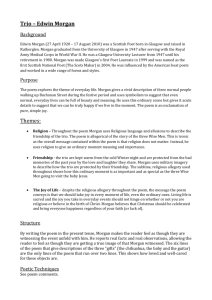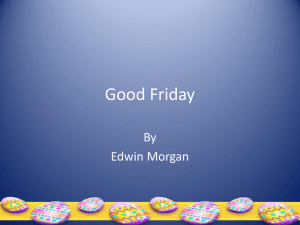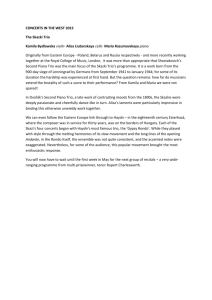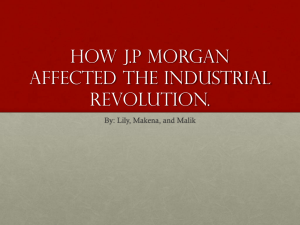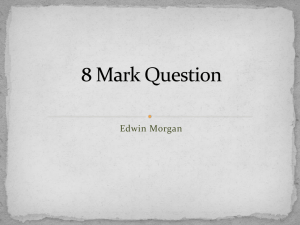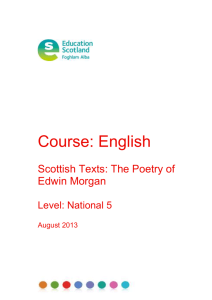Exemplar final question - Mr Clark
advertisement
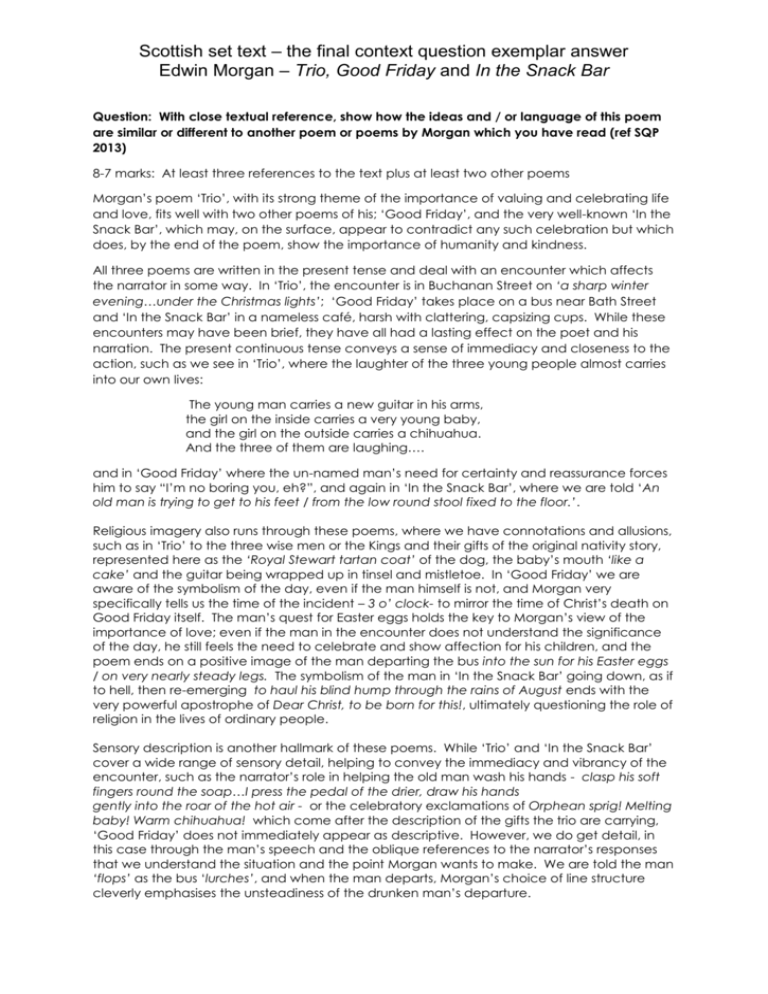
Scottish set text – the final context question exemplar answer Edwin Morgan – Trio, Good Friday and In the Snack Bar Question: With close textual reference, show how the ideas and / or language of this poem are similar or different to another poem or poems by Morgan which you have read (ref SQP 2013) 8-7 marks: At least three references to the text plus at least two other poems Morgan’s poem ‘Trio’, with its strong theme of the importance of valuing and celebrating life and love, fits well with two other poems of his; ‘Good Friday’, and the very well-known ‘In the Snack Bar’, which may, on the surface, appear to contradict any such celebration but which does, by the end of the poem, show the importance of humanity and kindness. All three poems are written in the present tense and deal with an encounter which affects the narrator in some way. In ‘Trio’, the encounter is in Buchanan Street on ‘a sharp winter evening…under the Christmas lights’; ‘Good Friday’ takes place on a bus near Bath Street and ‘In the Snack Bar’ in a nameless café, harsh with clattering, capsizing cups. While these encounters may have been brief, they have all had a lasting effect on the poet and his narration. The present continuous tense conveys a sense of immediacy and closeness to the action, such as we see in ‘Trio’, where the laughter of the three young people almost carries into our own lives: The young man carries a new guitar in his arms, the girl on the inside carries a very young baby, and the girl on the outside carries a chihuahua. And the three of them are laughing…. and in ‘Good Friday’ where the un-named man’s need for certainty and reassurance forces him to say “I’m no boring you, eh?”, and again in ‘In the Snack Bar’, where we are told ‘An old man is trying to get to his feet / from the low round stool fixed to the floor.’. Religious imagery also runs through these poems, where we have connotations and allusions, such as in ‘Trio’ to the three wise men or the Kings and their gifts of the original nativity story, represented here as the ‘Royal Stewart tartan coat’ of the dog, the baby’s mouth ‘like a cake’ and the guitar being wrapped up in tinsel and mistletoe. In ‘Good Friday’ we are aware of the symbolism of the day, even if the man himself is not, and Morgan very specifically tells us the time of the incident – 3 o’ clock- to mirror the time of Christ’s death on Good Friday itself. The man’s quest for Easter eggs holds the key to Morgan’s view of the importance of love; even if the man in the encounter does not understand the significance of the day, he still feels the need to celebrate and show affection for his children, and the poem ends on a positive image of the man departing the bus into the sun for his Easter eggs / on very nearly steady legs. The symbolism of the man in ‘In the Snack Bar’ going down, as if to hell, then re-emerging to haul his blind hump through the rains of August ends with the very powerful apostrophe of Dear Christ, to be born for this!, ultimately questioning the role of religion in the lives of ordinary people. Sensory description is another hallmark of these poems. While ‘Trio’ and ‘In the Snack Bar’ cover a wide range of sensory detail, helping to convey the immediacy and vibrancy of the encounter, such as the narrator’s role in helping the old man wash his hands - clasp his soft fingers round the soap…I press the pedal of the drier, draw his hands gently into the roar of the hot air - or the celebratory exclamations of Orphean sprig! Melting baby! Warm chihuahua! which come after the description of the gifts the trio are carrying, ‘Good Friday’ does not immediately appear as descriptive. However, we do get detail, in this case through the man’s speech and the oblique references to the narrator’s responses that we understand the situation and the point Morgan wants to make. We are told the man ‘flops’ as the bus ‘lurches’, and when the man departs, Morgan’s choice of line structure cleverly emphasises the unsteadiness of the drunken man’s departure. Scottish set text – the final context question exemplar answer Edwin Morgan – Trio, Good Friday and In the Snack Bar In conclusion, these three poems effectively and memorably convey Morgan’s enduring belief in the value of life, love and friendship, with or without religion.

